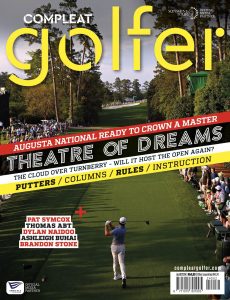The outside world sometime takes a while to reach the humble golf club I call home, and when it does, it tends to be about as welcome as a mother- in- law bearing luggage. So forgive me if this is old news to you, but through-out the month of February the two words you could hear muttered with murderous intent by more than half our membership were ‘85’ and ‘percent’.
There is a clear divide in most golf clubs between those who relish filling in scorecards and those who would rather eat their own earwax. I fall into the latter category. I should stress that this reluctance is not about cheating, but about indolence. And mathematics. Especially mathematics.
The thing is, it’s hard enough getting four superannuated golfers to the 1st tee simultaneously. To then explain to them that today, thanks to an edict by the World Handicap System (WHS), they will be playing off 85% of their handicap is simply a bridge too far. ‘Why?’ they cry. ‘What’s the point of having a handicap if you can only have 85% of it?’
I did some research and the long and the short of it seems to be that, in the opinion of the crafters of WHS, the handicap system discriminates against good players. Your scratch man is upset that he has to give some retired second-hand car dealer 24 shots. In the unlikely event that said ex-car dealer actually plays to his handicap, the scratch man could lose.
The fact that this might happen one time in 30 is apparently irrelevant. The 85% rule therefore removes four shots from our happy hacker, to save the blushes of our unencumbered scratch man, since 85% of 0 is still 0. Now, I can only speak for myself, but it seems to me that we have the cart before the horse here.
Let me digress about the fundamental dichotomy of the game. On the one hand, we have people who are good at golf, who strive to beat Old Man Par, practise religiously and compete fiercely against similarly good players. On the other hand, we have the rest of us, the people who swing in hope rather than in expectation, whose very presence keeps many golf clubs from going under.
Surely the whole point of handicaps in the first place is to protect the latter from the former, not the other way around. Medal rounds identify the best players and they are played extremely infrequently because no one cares to shoot fish in a barrel. We play betterball, scrambles, greensomes and the like precisely because, in formats other than medal, there’s a chance, albeit a very slim one, that a bad golfer can beat a good one.
To use a football analogy, remember the romance of the FA Cup. Instead of strength against strength, teams from all over the lower leagues compete for David’s chance against Goliath. In 1972, non-league Hereford beat mighty Newcastle United. In 1992, Fourth Division Wrexham beat reigning league champions Arsenal, 2-1 at Highbury.
We remember these results because they are unusual and, for many, the romance of the Cup ends when the last non-Premiership team is knocked out. But as a wise man once said, soccer is a simple game for simple folk. Golf is hard and there is absolutely no need to make it harder by campaigning without 15% of your handicap.
– This column first appeared in the April 2024 issue of Compleat Golfer magazine.

The post Andy Capostagno Column: Making golf harder appeared first on Compleat Golfer.
Article Link: Andy Capostagno Column: Making golf harder
